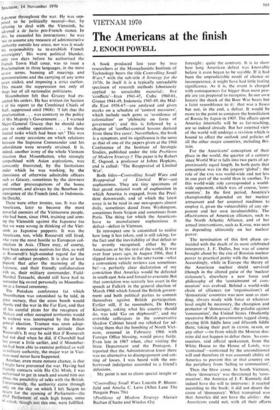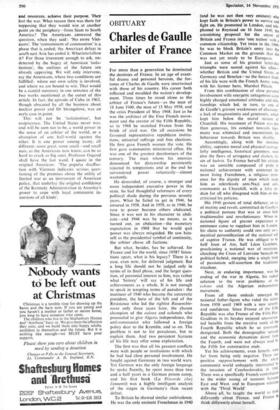VIETNAM 1970
The Americans at the finish
J. ENOCH POWELL
A book produced last year by two researchers at the Massachusetts Institute of Technology bears the title Controlling Small Wars.* with the sub-title A Strategy for the 1970s. In itself it is a typically unreadable specimen of research methods laboriously applied to unsuitable material: five 'conflicts'—Iran 1941-47, Cuba 1960-61, Greece 1944-49, Indonesia 1945-49, the Mid- dle East 1956-67—are analysed and given marks on a schedule of 'control measures', which include such gems as 'avoidance of colonialism' or 'plebiscite on form of government': and this is followed by a chapter of 'conflict-control lessons derived from these five cases'. Nevertheless, the book is a symptom, and its significance is the same as that of one of the papers given at the 1968 Conference of the Institute of Strategic Studies, published under the title Problems of Modern Strategy.? The paper is by Robert E. Osgood, a professor at Johns Hopkins, and is called: 'The Reappraisal of Limited War'.
Both titles—Controlling Small Wars and Reappraisal of Limited War—are euphemisms. They are tiny specimens of that grand national work of euphemism in which America is engaged, from the Presi- dent downwards, and of which the latest essay is to be read in our newspapers almost daily, sometimes dated from Washington, sometimes from Saigon and sometimes from Paris. The thing for which the Americans have to manufacture euphemisms is defeat—defeat in Vietnam.
In retrospect one is astonished to realise how long it has taken, and is still taking, for the fact and the inevitability of that defeat to be overtly recognised, either by the Americans or by the rest of the world. It was over four years ago, in August 1966, that I slipped into a review in the SPECTATOR—what a convenient vehicle reviews can sometimes be!—a perfectly clear declaration of my conviction that America would be defeated in south-east Asia and forced to evacuate. But that conviction was scarcely less overt in the speech at Falkirk in the general election of March 1966 which forced the British govern- ment and both political parties to commit themselves against British participation. Earlier still, if he remembers, Dr Henry Kissinger, asking what his country should do, was told 'Go on shipboard!', and my erstwhile colleagues in the conservative Shadow Cabinet heard me rebuked for ad- vising them that the bombing of North Viet- nam, resumed in February 1966 with Foreign Office blessing, would prove futile. Even late in 1967 when, after visiting the State Department and the Pentagon, I reported that the Administration knew there was no alternative to disengagement and cut- ting of losses. I was heard with the em- barrassed indulgence accorded to a friend's delusions.
My point is not to claim special insight or *Controlling Small Wars Lincoln P. Bloom- field and Amelia C. Leiss (Allen Lane The Penguin Press 70s) tProblems of Modern Strategy Alastair Buchan (Chatto and Windus 42s) foresight: quite the contrary. It is to show how long American defeat was knowable before it even began to be sayable. If it had been the unpredictable result of chance or incompetence, it might have had little lasting significance. As it is, the event is charged with consequences far bigger than most peo- ple are yet prepared to recognise. In our own history the shock of the Boer War bears but a faint resemblance to it: that was a fiasco but not, in the end, a defeat. It would be more to the point to compare the humiliation of Russia by Japan in 1905. The effects upon America internally will be as far-reaching, are so indeed already. But her external view of the world will undergo a revision which is bound to affect the outlook and policies of all the other major countries, including Bri- tain.
For the Americans' conception of their place in the world, the quarter of a century since World War 11 falls into two parts of ap- proximately equal length. In both parts that conception was (in the jargon) 'global': the role of the USA was world-wide and not less in one part of the world than in another. To this world-wide role corresponded a world- wide opponent, which was, of course, 'com- munism'. In the first period, America's championship depended on her nuclear armament and her assumed readiness to employ it, given the vulnerability of any op- ponent and her own invulnerability. The effectiveness of American alliances, such as the North Atlantic Alliance, and of her armed interventions, such as Korea, was seen as depending ultimately on her nuclear power.
The termination of this first phase co- incided with the death of its most celebrated interpreter, J. F. Dulles, but was of course brought about by the rise of Russian nuclear power to practical parity with the American. Accordingly, while in Europe the theory of the American nuclear shield survived (though in the altered guise of the 'nuclear stalemate'), elsewhere a new form and philosophy of the 'containment of com- munism' was evolved. Behind a world-wide chain of alliances (or 'organisations') of 'democratic' countries was now seen as stan- ding, always ready with force at whatever level might be necessary, the champion and protector of 'democracy', the paladin against 'communism', the United States. Obediently successive British governments tagged along, playing fifth fiddle here and fifteenth fiddle there, taking their part in CEN10, SEATO, or any other —To from which the Monroe doc- trine did not happen to debar them. So com- munism, said official spokesmen, from the White House to the House of Lords, was 'contained'—contained by the unconditional will and therefore (it was assumed) ability of America to prevent this or that country on the periphery from 'falling to communism'.
Then the blow came. In South Vietnam, where 'democracy' was threatened by 'com- munism', the America of J. F. Kennedy did indeed have the will to intervene: it reacted according to the book; it did not desert the cause of 'democracy'. What transpired was that America did not have the ability: the Americans could not, with all their efforts and resources, achieve their purpose. They lost the war. What reason then was there for supposing that they would win at another point on the periphery—from Siam to South America? The Americans answered the question, when they said: 'No more Viet- nams'. The 'containment of communism' is a phase that is ended; the American defeat in south-east Asia has ended it. What is to follow it? For those irreverent enough to ask, un- deterred by the bogey of American 'isola- tionism', the outlines of the future are already appearing. We will only intervene, say the Americans, where two conditions are fulfilled: where our own safety is involved, and where we are bound to win. That would be a candid summary in one sentence of the two works mentioned at the outset of this article. In fact, the episode of Cuba in 1962, though obscured by all the business about nuclear power and Dr Strangelove, was an early case in point.
This will not be 'isolationism', but resipiscence. The United States never was, and will be seen not to be, a world power in the sense of an arbiter of the world, or a champion of one half-world against the other. It is one power among many, all different, some great, some small—and small nuts, as the Americans now know, can be as hard to crack as big ones. Professor Osgood shall have the last word. I quote in the original American : 'The popular disaffec- tion with Vietnam indicates serious ques- tioning of the premises about the utility of limited war as an instrument of American policy, that underlay the original confidence of the Kennedy Administration in America's power to cope with local communist in- cursions of all kinds'.









































 Previous page
Previous page